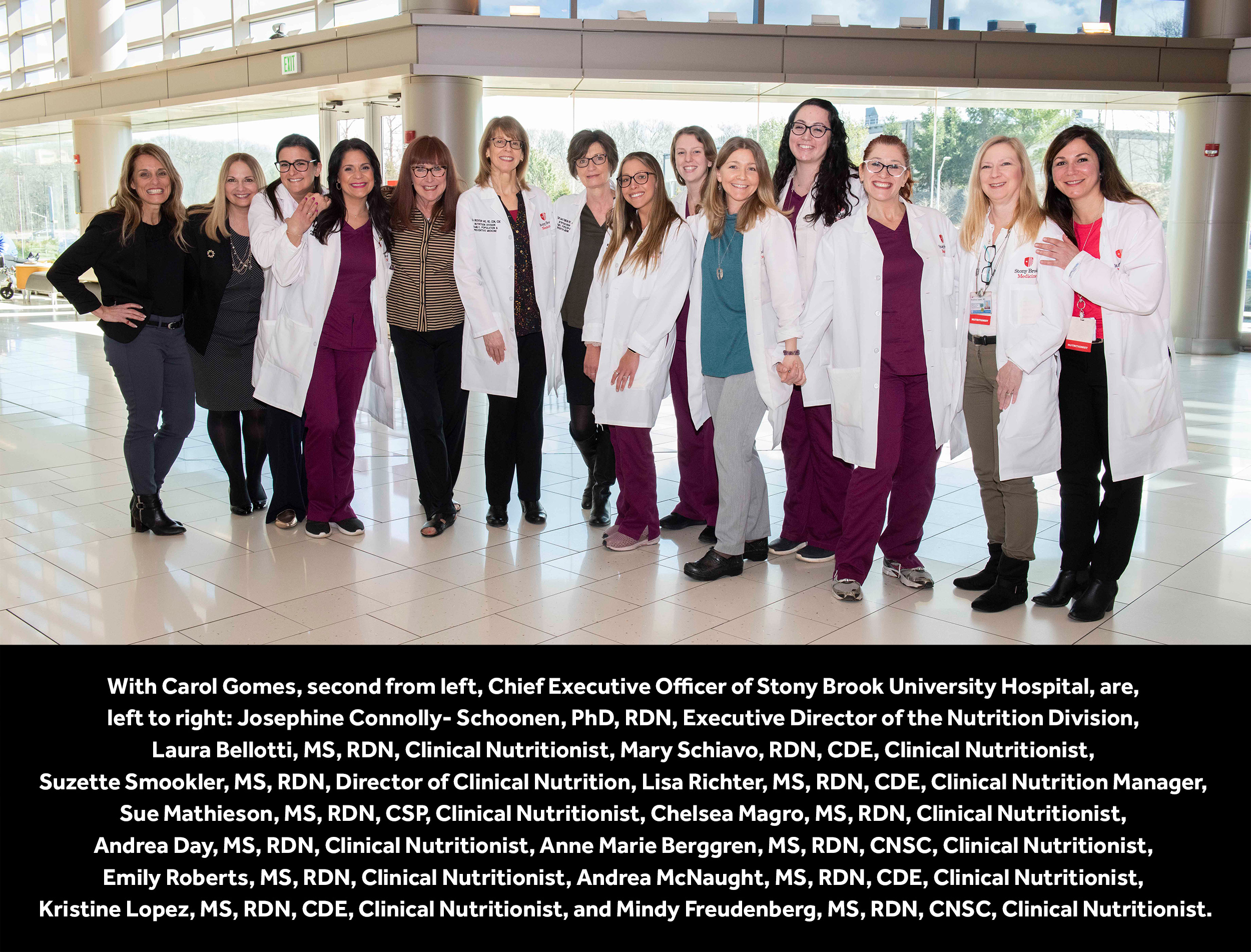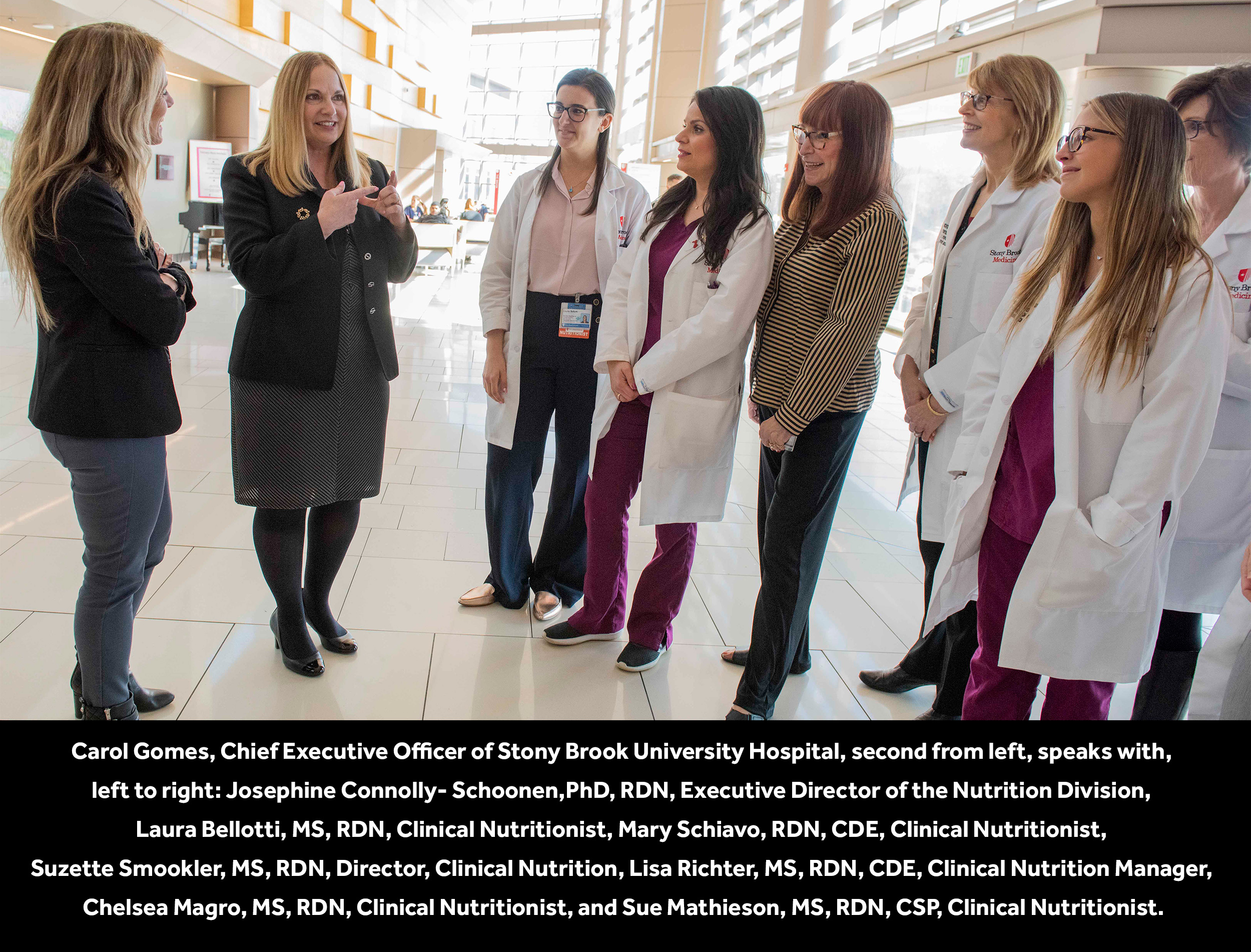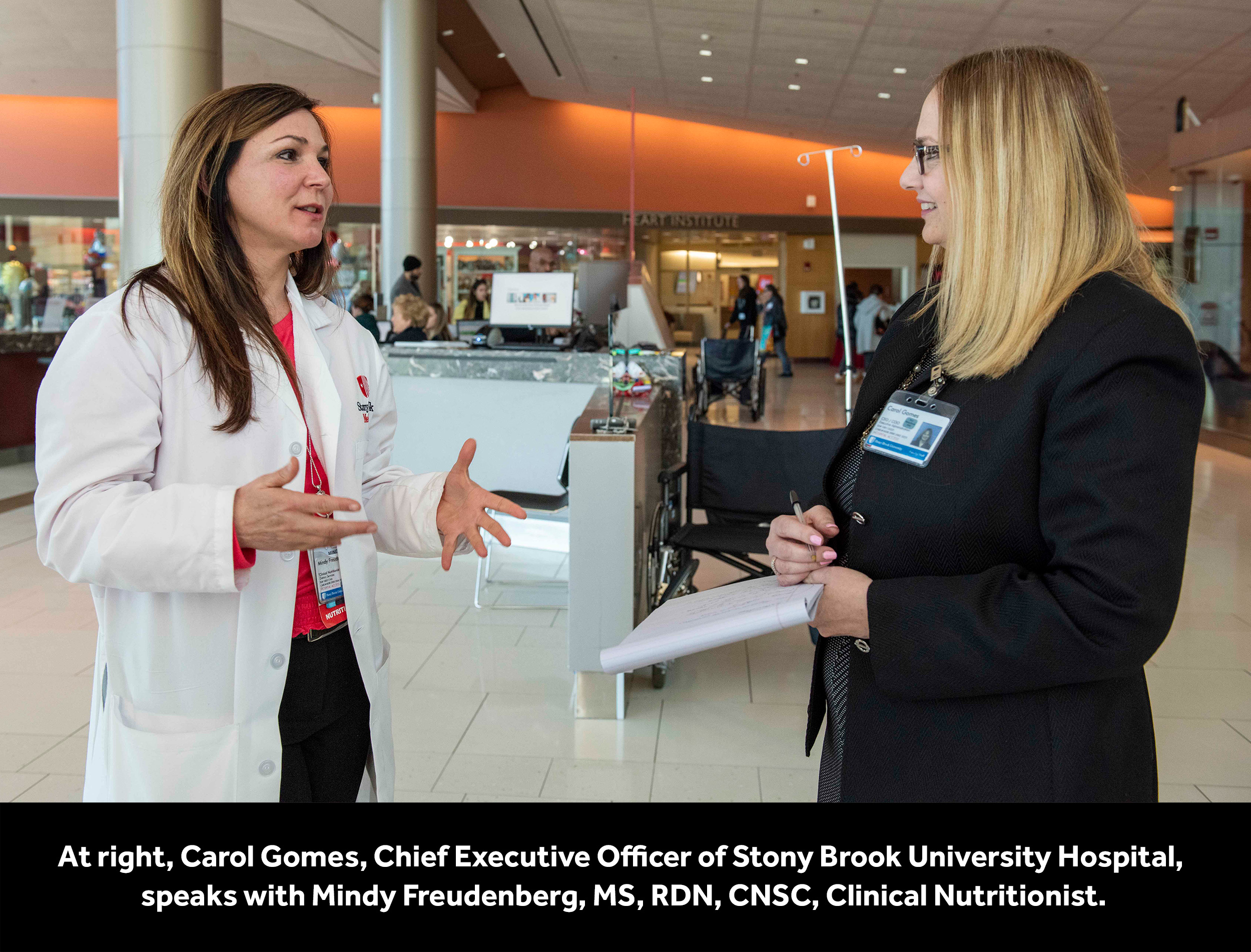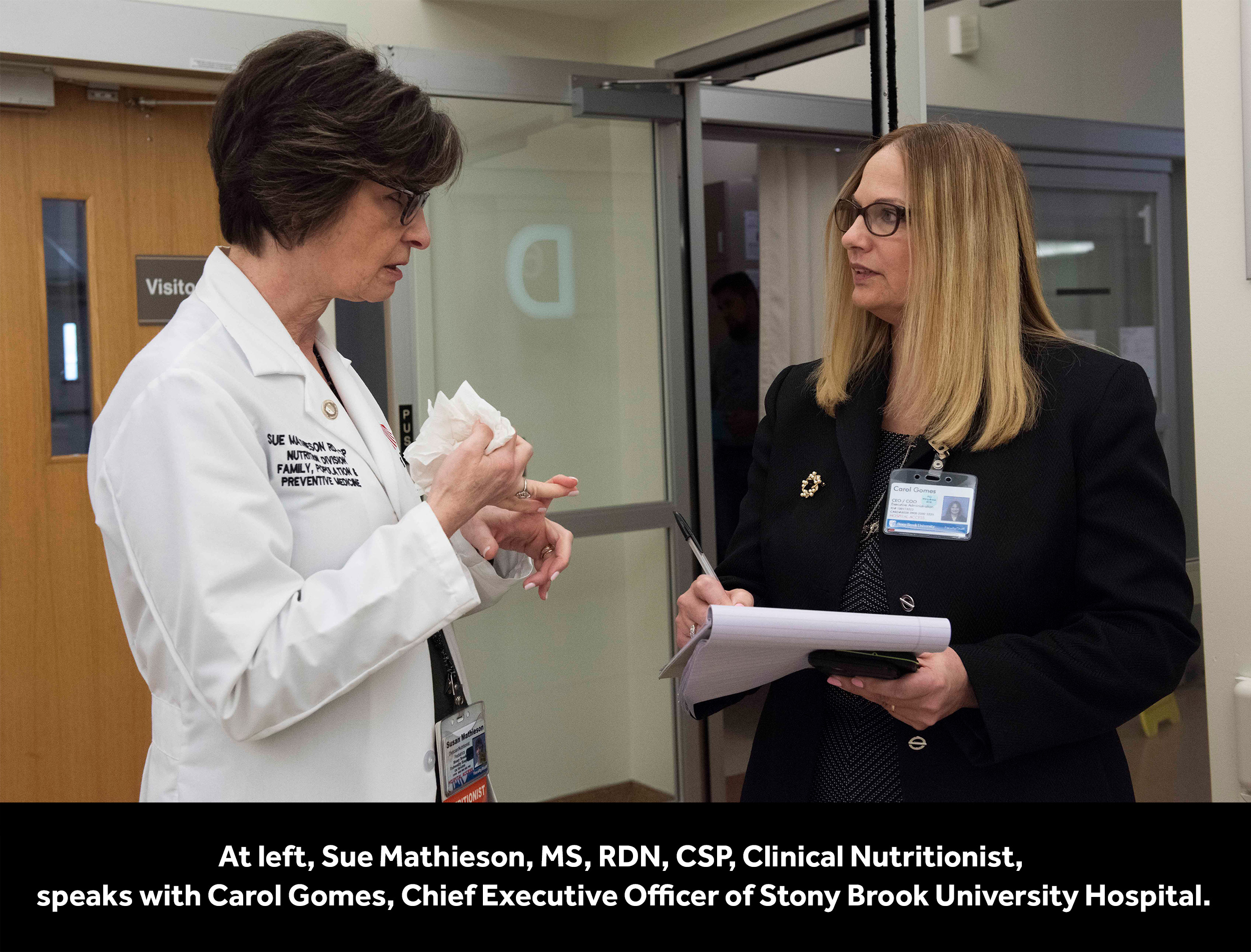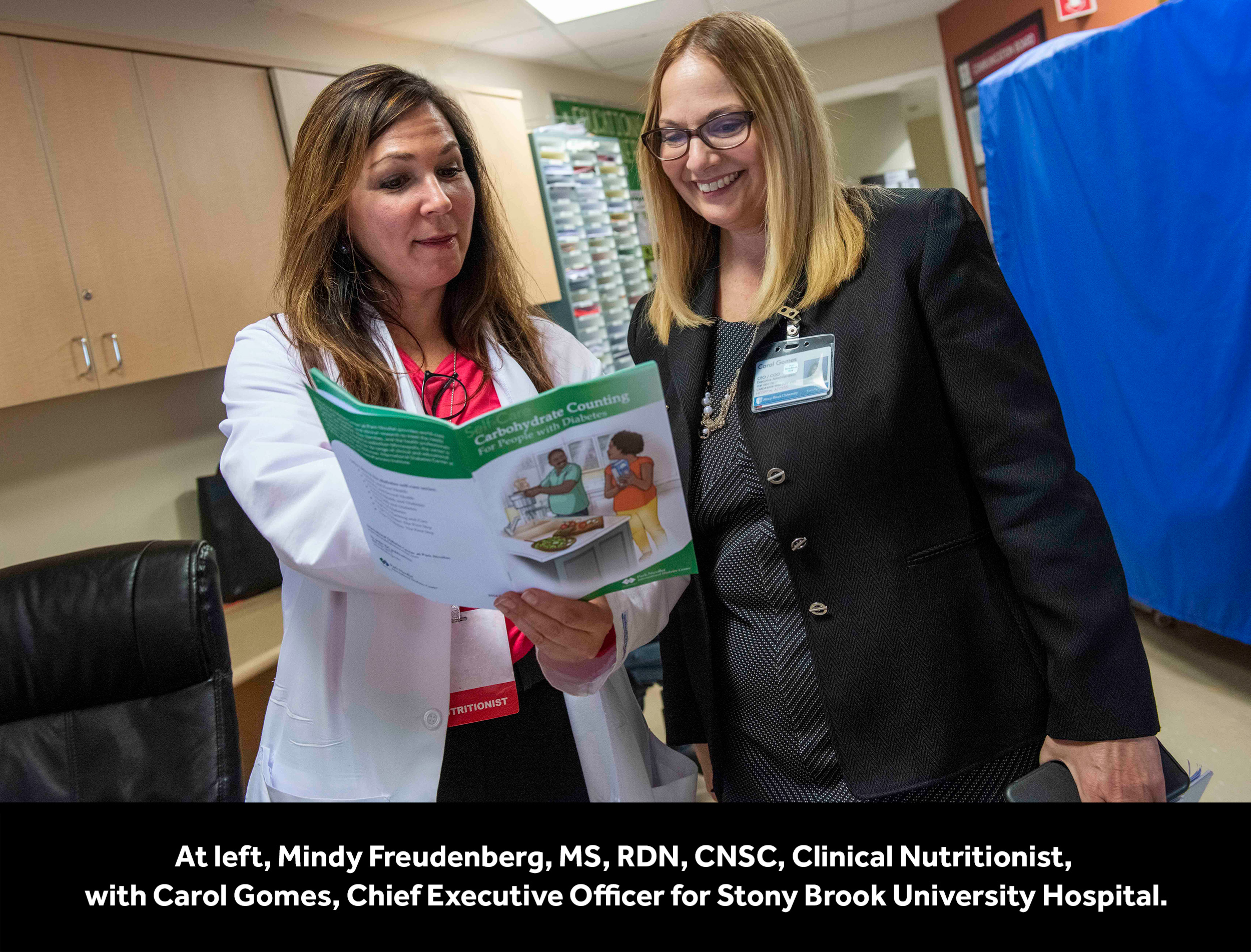Earlier this year – before the coronavirus pandemic ushered in the age of social distancing – I had the honor of rounding with our Clinical Nutrition Services Team to learn about the vital role they play as part of the healthcare team, providing nutritional care to patients in various disease states and conditions.
Understanding and applying nutrition knowledge and skills to all aspects of healthcare is extremely important, since nutrition is a critical component of acute and chronic disease management. In the hospital setting, compromised nutrition can lead to slow healing and recovery and may extend hospital stays.
Suzette Smookler, Director of Nutrition Services, explained how our clinical nutrition team mirrors Stony Brook Medicine’s mission by using a three-pronged approach: clinical care, education and research. Clinical dietitians monitor, assess and optimize nutrition status based on the patient's current medical condition and/or nutrition adequacy. They confer with physicians and other healthcare professionals to coordinate medical and nutritional needs, and they make recommendations for tube and intravenous feedings and/or dietary supplements. Clinical dietitians also teach patients how to make nutritionally sound food choices to speed the recovery process, prevent disease and maintain a healthy lifestyle.
Dietitian Mary Schiavo said that educating patients is one of the best aspects of her job, as it fosters empowerment and provides patients with a sense of control over their diagnosis. Mary and the other dietitians work closely with physicians, nurses, speech therapists, and pharmacists on a day-to-day basis.
On a typical day, they review a daily list of patients and determine prioritization. After conducting a screening, which includes the patient’s diagnosis, medical history, labs, medications, food intake records, current diet, and food allergies, they will visit the patient to consult and educate them regarding their diet and any health conditions related to nutrition. If the patient has special dietary needs, the dietician will discuss with the doctor and add this information into the electronic medical record. If the patient is not meeting nutritional needs, the dietitian can provide nutritional supplements for the patient after obtaining approval from the doctor.
“We, as dietitians, are an important piece of the healthcare team,” Mary said. “It’s nice to be needed and valued.”
Sue Mathieson, a seasoned dietitian who has been at SBUH for 25 years, introduced me to her world as she cared for newborns in the Neonatal Intensive Care Unit (NICU). Sue is a certified pediatric specialist and was the first NICU dietician at SBUH.
Neonatal dietitians are registered dietitians with specialized training and experience in newborn nutrition. In order to obtain this certification, one must pass a national exam, which requires at least a bachelor's degree in nutrition and a 900-hour internship to earn the registered dietitian designation from the Academy of Nutrition and Dietetics’ Commission on Dietetic Registration. Sue works with our most vulnerable patients. In order to grow and develop, these high risk newborns require specialized attention from neonatal dietitians who assess nutritional needs, develop eating programs, monitor growth progress, and counsel parents to help neonates thrive. As she introduced me to the equipment she uses on a daily basis, Sue said, “I love what I do because no two days are alike.”
Dietitian Mindy Freudenberg expressed how much the profession has grown. Until a few decades ago, most dietitians were thought of as “food service people.” Historically, dietitians did not spend as much time seeing and diagnosing patients as they did working with the kitchen staff to provide the right meal, with the right consistency, at the right time.
Although the food-service component of dietetics is still very much needed, dietitians are now an integrated part of the clinical care team, working with nurses and physicians to develop plans for patients who are not being adequately fed. Mindy works with patients who require Total Parenteral Nutrition (TPN), as these patients cannot obtain adequate nutrition through their digestive tract.
TPN provides all or most of the required calories and nutrients through solutions that contain a mixture of protein, carbohydrates, glucose, fat vitamins and minerals using vascular access devices, such as Peripherally Inserted Central Catheter (PICC) lines. Mindy spends most of her time in the Medical Intensive Care Unit (MICU), visiting every patient on a ventilator and working with the nurses and physicians to develop a nutrition plan for these patients.
Josephine Connolly-Schoonen, Assistant Director, Clinical Nutrition, said the department is also involved in research projects. SBUH is one of only a few hospitals in the region to have an Indirect calorimeter machine, which is used to measure pulmonary gas exchanges in patients and is considered the gold standard to determine energy expenditure (EE). Josephine explained that the need for accurate determination of EE is increasing due to the rising prevalence of patients with clinical conditions characterized by difficulty in estimating EE and variability in energy needs.
Especially in ICU patients, EE is highly variable according to the initial injury, severity of disease, nutritional status, lean body mass, frequent changes in clinical condition, and treatment interventions. The indirect calorimeter is a non-invasive technique that allows clinicians to personalize the prescription of nutrition support for patient metabolic needs and promotes a better clinical outcome.
Suzette mentioned that the Clinical Nutrition team, including Kristine Lopez, also helps to take care of the rooftop farm, which is another unique program to SBUH. The team waters the seedlings and is proud when items from the farm are incorporated into patients meal plans; a tent card is provided on the patient tray to indicate that the item is “farm-to-bedside” and was cultivated right here at SBUH.
The newest member of the team, Laura Bellotti, started in June after completing her clinical internship at SBUH. This is a second career for her, as she is a licensed accountant.
Laura said that, as an athlete – she played volleyball in high school and college and now coaches – she has always been passionate about nutrition. “Working as a registered dietitian is very rewarding,” she said, “and I am so happy I chose this job.”
It was truly my pleasure to spend some time with the Clinical Nutrition Team and see firsthand the passion they have for empowering and motivating our patients to make diet and lifestyle changes that can improve their lives. Their expertise helps to make a difference, inspire change, and help those in need.
Carol


